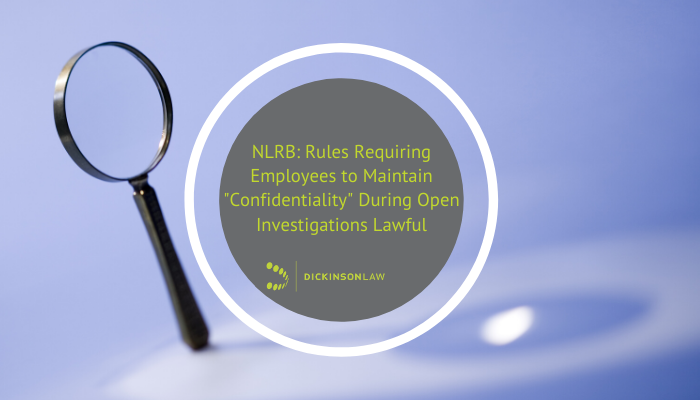NLRB: Rules Requiring Employees to Maintain “Confidentiality” During Open Investigations Lawful

Posted on 01/23/2020 at 09:50 AM by Russell Samson
On December 17*, 2019, the National Labor Relations Board issued its decision in Apogee Retail LLC d/b/a Unique Thrift Store. When issued, the opinion was 3 to 1, with Lauren McFerran dissenting. *Through the magic of technology, while the press release still is dated December 17, 2019, both the opinion and the chronological listing on the Board’s website, are dated December 16, 2019 – the last day of Member McFerran’s term.
In 2017, in The Boeing Co., the Board announced new standards that would be applied in evaluating the lawfulness of facially-neutral work rules or policies. Apogee Retail operates stores nationwide selling second-hand clothing. It had two provisions dealing with confidentiality. The first provision, found in its Code of Business Conduct and Ethics, provided in relevant part:
Report Illegal or Unethical Behavior. Team members are expected to cooperate fully in investigations and answer any questions truthfully and to the best of their ability. Reporting persons and those who are interviewed are expected to maintain confidentiality regarding these investigations. [Italics added by NLRB in its opinion.]
The second provision is contained in company’s Loss Prevention Policy and states in relevant part:
The following list, neither all-inclusive nor exhaustive, are examples of behaviors that can have an adverse effect on the company and may lead to disciplinary action, up to and including termination: . . . . Refusing to courteously cooperate in any company investigation. This includes, but is not limited to, unauthorized discussion of investigation or interview with other team members. . . . [Italics added by NLRB in its opinion.]
The Board majority noted that the company had never disciplined any employee for violating either of these rules.
Apogee Retail got before the Board in a unique manner. In 2017, an individual filed a charge with the NLRB, contending that the rules set forth above violated Section 8(a)(1) of the Act on their face. Presumably in reliance on Banner Health (discussed below), the NLRB General Counsel issued a complaint and a notice of hearing. The Board then issued its decision in The Boeing Company, with its new standards. The hearing was ultimately postponed indefinitely. In October 2018, the General Counsel and the company filed a joint motion waiving a hearing before an administrative law judge and transferring the case to the Board for a decision based on a stipulated record. In December 2018, the Board granted that joint motion.
In the Board’s 2015 Banner Health Systems decision, the employer was alleged to have had a policy of requesting individuals who were interviewed as part of a company investigation to not discuss the matter with co-workers while the investigation was continuing. While the ALJ in Banner Health had ruled there was no violation of Section 8(a)(1), a two-person Board majority (both Democrats) in Banner Health – which included Member McFerren – concluded otherwise. Following Banner Health, there appeared to be a general presumption that such general policies regarding maintaining confidentiality would be unlawful – even in the absence of any evidence that the policy or practice had actually affected the exercise of Section 7 rights. Indeed, some have suggested that Banner Health came, “very close to making generally applicable confidentiality policies unlawful per se.”
Apogee Retail was not delegated to a three-member panel, but rather was considered by the “full” (albeit only 4 active members) Board. In its Boeing Company decision, the Board instructed that in considering a challenge to a facially neutral policy, rule or handbook provision, it will evaluate both the nature and extent of the potential impact on NLRA rights and the legitimate justifications for the restrictions, and then strike a balance.
Here, the three-person Board majority determined that many of Apogee Retail’s business justifications for its rules – protecting employee privacy, protecting employees from retaliation, and ensuring the integrity of an investigation – were shared by all employers, and indeed were shared by employees as well. While acknowledging that the rules had a potential to interfere with Section 7 rights, the majority determined that the impact was relatively slight, especially when the confidentiality was limited to the period during which the investigation was being conducted.
The Board determined as a matter of general policy that investigative confidentiality rules limited to the duration of open investigations will fall into “Boeing Category 1.” That is, any rule, policy or practice which requests or requires employees to maintain confidentiality during the duration of the open investigation will be found lawful, without a case-by-case balancing of interests.
The Board continued that investigative confidentiality rules not limited on their face to the period the investigation is open or ongoing would be determined to fall into “Boeing Category 2” – rules or policies that require individualized scrutiny in order to determine their lawfulness.
Here, Apogee Retail’s rules were not, on their face, limited in duration to the period when the investigation was open. Because the case got before the Board based on stipulated facts without a trial, the Board had nothing upon which to conduct the individualized scrutiny required of a “Boeing Category 2” rule. The Board sent the case back to the Region.
Employers who conduct workplace investigations and either had none, or rescinded policies or practices which required or even requested employees to maintain confidentiality as part of the investigation, may wish to revisit the topic with the assistance of a competent professional.
Categories: Russ Samson, Employment & Labor Law
Questions, Contact us today.
The material, whether written or oral (including videos) that is posted on the various blogs of Dickinson Bradshaw is not intended, nor should it be construed or relied upon, as legal advice. The opinions expressed in the various blog posting are those of the individual author, they may not reflect the opinions of the firm. Your use of the Dickinson Bradshaw blog postings does NOT create an attorney-client relationship between you and Dickinson, Bradshaw, Fowler & Hagen, P.C. or any of its attorneys. If specific legal information is needed, please retain and consult with an attorney of your own selection.







